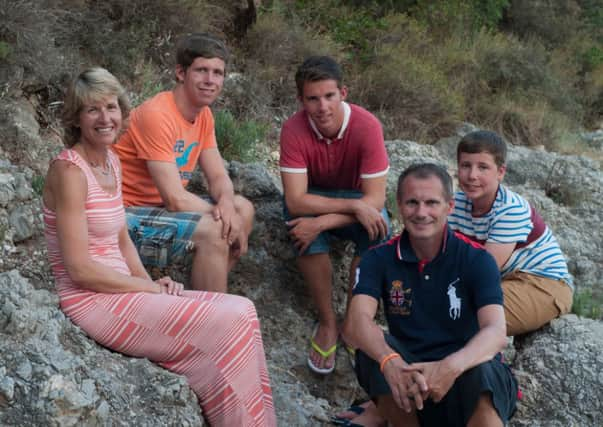Inquest into death of respected GP


Dr Michael Barsby died on November 15th 2013 aged just 43 after being diagnosed with his supposedly inoperable condition in October 2012.
From the outset the prognosis was poor and despite chemotherapy as well as further scans this prognosis did not change and Dr Barsby was told his condition was inoperable due to the position of the tumour.
Advertisement
Hide AdAdvertisement
Hide AdHe subsequently made the decision to have pioneering surgery in Germany to remove the tumour, an operation the family had read about on the internet. No similar operation was offered to Dr Barsby at Manchester Royal Infirmary where he had been undergoing treatment his widow Susan told the inquest.
In Germany Dr Barsby underwent a pancreatectomy during which the tumour, his pancreas and spleen were surgically removed.
Dr Barsby made a good recovery from the surgery and after returning home, he and his family were “cautiously optimistic” with scans showing no definite evidence of tumour reoccurrence.
However, the surgery had caused hypertension to develop over several months, increasing the blood pressure in his arteries and eventually causing the vessels in his gullet to rupture, the inquest heard.
Advertisement
Hide AdAdvertisement
Hide AdThis then caused a “massive” gastro-intestinal bleed that quickly led to his death at the Royal Blackburn Hospital on November 15th.
Pathologist Dr Aslam said the surgery, known as the Whipples procedure, had been a “calculated risk” in view of his poor prognosis.
Assistant coroner for Blackburn Derek Baker recorded a narrative verdict and said Dr Barsby died from the ruptured oesophageal varices which is a recognised complication of his surgery for pancreatic cancer.
Mr Baker apologised to Dr Barsby’s widow Susan, who gave evidence during the proceedings, that she had to relive these awful memories.
Advertisement
Hide AdAdvertisement
Hide Ad“The original diagnosis, I have no doubt, would have led to Dr Barsby’s death,” he said, “but the surgery I think was the direct cause of death.
“There’s no evidence it wasn’t competently carried out, or the gamble wasn’t sensible. I strongly suspect this tragic outcome would have occurred in any event.”
He then referred to comments made by Pathologist Dr Aslam who when asked what he would have done if he was in Dr Barsby’s shoes, said: “If I was that person I would’ve been doing the same.”
He added Dr Barsby may have had a chance if it hadn’t have been for the acute bleed, but that his pancreatic cancer would have ultimately proved fatal. A post mortem, however, did reveal Dr Barsby’s abdominal cavity was clear of pancreatic cancer when he died.
Advertisement
Hide AdAdvertisement
Hide AdDr Aslam went on to say that Dr Barsby’s quality of life would have most certainly deteriorated without the surgery.
A well-known figure in the Ribble Valley, Dr Barsby who worked at Kiddrow Lane Health Centre in Burnley, did his GP training at Whalley Medical Practice.
He was the inspiration for a fund-raising calendar produced by his wife and many of their friends at their gym, Crossfit Clitheroe, to raise money for Pancreatic Cancer UK.
A loving father to twins Christian and James (18) and Oliver (13), Michael who was married to Susan for 20 years, having met at the age of 16 when they were both members of Billington Venture Scouts, grew up in Wilpshire.
Advertisement
Hide AdAdvertisement
Hide AdHe was educated at QEGs in Blackburn, before going on to Manchester Medical School and then completing his training at Blackburn Royal and Queens Park Hospitals.
As well as attending Crossfit, Michael kept fit by playing football with his “Mad Dogs” team (made up of health professionals) every week, a ritual that he upheld even when receiving chemotherapy.
Speaking to the Clitheroe Advertiser after his death, Susan said: “Although a return of the disease was never far from our minds, we agreed that if he hadn’t undergone the surgery he wouldn’t have had the quality of life that he had for the last few months. It gave us back a complete normality which was wonderful.”